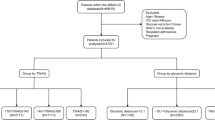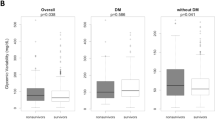Abstract
Some studies have shown that intensive glucose control (IGC) improves outcome in the intensive care unit setting. However, it is the benefit of IGC in hematopoietic SCT (HSCT) that is not well defined. Between June 2006 and May 2007, IGC was maintained prospectively after allogeneic HSCT and clinical outcomes were compared with a cohort matched for conditioning regimen, source of stem cells, age and relation to donor. A stratified Cox regression model was used. There were no significant differences in baseline clinical characteristics. The median age was 43.5 years in both groups. The primary diagnosis was a hematologic malignancy. Patients in the IGC group had a lower glucose level (least-square mean, 116.4 vs 146.8 mg per 100 ml, P<0.001) compared to the standard glucose control group. The incidences of documented infections and bacteremia were significantly lower in the IGC group (14 vs 46%, P=0.004, 9 vs 39%, P=0.002, respectively). IGC tended to reduce the incidence of renal dysfunction (19 vs 37%, P=0.36) and the elevation of C-reactive protein (18 vs 38%, P=0.13). This study suggests that IGC has may have a beneficial effect after HSCT. IGC should be evaluated further in a large prospective, randomized study.
This is a preview of subscription content, access via your institution
Access options
Subscribe to this journal
Receive 12 print issues and online access
$259.00 per year
only $21.58 per issue
Buy this article
- Purchase on Springer Link
- Instant access to full article PDF
Prices may be subject to local taxes which are calculated during checkout




Similar content being viewed by others
References
Van den Berghe G, Wouters P, Weekwrs F, Verwaest C, Bruyninckx F, Schetz M et al. Intensive insulin therapy in the critically ill patients. N Engl J Med 2001; 345: 1359–1367.
Van den Berghe G, Wilmer A, Hermans G, Meersseman W, Wouters PJ, Milants I et al. Intensive insulin therapy in the medical ICU. N Engl J Med 2006; 354: 449–461.
Van den Berghe G, Wouters PJ, Bouillon R, Weekers F, Verwaest C, Schetz M et al. Outcome benefit of intensive insulin therapy in the critically ill: insulin dose versus glycemic control. Crit Care Med 2003; 31: 359–366.
Krinsley JS . Association between hyperglycemia and increased hospital mortality in a heterogeneous population of critically ill patients. Mayo Clin Proc 2003; 78: 1471–1478.
Krinsley JS . Effect of an intensive glucose management protocol on the mortality of critically ill adult patients. Mayo Clin Proc 2004; 79: 992–1000.
Vogelzang M, Nijboer JM, van der Horst IC, Zijlstra F, ten Duis HJ, Nijsten MW . Hyperglycemia has a stronger relation with outcome in trauma patients than in other critically ill patients. J Traum 2006; 60: 873–877.
Ingels C, Debaveye Y, Milants I, Buelens E, Peeraer A, Devriendt Y et al. Strict blood glucose control with insulin during intensive care after cardiac surgery: impact on 4-years survival, dependency on medical care, and quality-of-life. Eur Heart J 2006; 27: 2716–2724.
Jeschke MG, Klein D, Bolder U, Einspanier R . Insulin attenuates the systemic inflammatory response in endotoxemic rats. Endocrinology 2004; 145: 4084–4093.
Brix-Christensen V, Andersen SK, Andersen R, Mengel A, Dyhr T, Andersen NT et al. Acute hyperinsulinemia restrains endotoxin-induced systemic inflammatory response: an experimental study in a porcine model. Anesthesiology 2004; 100: 861–870.
Sheean PM, Freels SA, Helton WS, Braunschweig CA . Adverse clinical consequences of hyperglycemia from total parenteral nutrition exposure during hematopoietic stem cell transplantation. Biol Blood Marrow Transplant 2006; 12: 656–664.
Sheean PM, Braunschweig C, Rich E . The incidence of hyperglycemia in hematopoietic stem cell transplant recipients receiving total parenteral nutrition: a pilot study. J Am Diet Assoc 2004; 104: 1352–1360.
Fietsam Jr R, Bassett J, Glover JL . Complications of coronary artery surgery in diabetic patients. Am Surg 1991; 57: 551–557.
Ortiz A, Ziyadeh FN, Neilson EG . Expression of apoptosis-regulatory genes in renal proximal tubular epithelial cells exposed to high ambient glucose and in diabetic kidney. J Invest Med 1997; 45: 50–56.
Vanhorebeek I, De Vos R, Mesotten D, Wouters PJ, De Wolf-Peeters C, Van den Berghe G . Protection of hepatocyte mitochondrial ultrastructure and function by strict blood glucose control with insulin in critically ill patients. Lancet 2005; 365: 53–59.
Fuji S, Kim SW, Mori S, Fukuda T, Kamiya S, Yamasaki S et al. Hyperglycemia during the neutropenic period is associated with a poor outcome in patients undergoing myeloablative allogeneic hematopoietic stem cell transplantation. Transplantation 2007; 84: 814–820.
Saito AM, Kami M, Mori SI, Kanda Y, Suzuki R, Mineishi S et al. Prospective phase II trial to evaluate the complications and kinetics of chimerism induction following allogeneic hematopoietic stem cell transplantation with fludarabine and busulfan. Am J Hematol 2007; 82: 873–880.
Fuji S, Kim S, Fukuda T, Kamiya S, Kuwahara S, Takaue Y . Positive impact of maintaining minimal caloric intake above 1.0 × basal energy expenditure on nutritional status of patients undergoing allogeneic hematopoietic stem cell transplantation. Am J Hematol 2008; 84: 63–64.
Muscaritoli M, Grieco G, Capria S, Iori AP, Rossi Fanelli F . Nutritional and metabolic support in patients undergoing bone marrow transplantation. Am J Clin Nutr 2002; 75: 183–190.
Fuji S, Kim SW, Fukuda T, Mori S, Yamasaki S, Morita-Hoshi Y et al. Pre-engraftment serum C-reactive protein (CRP) value may predict acute graft-versus-host disease and non-relapse mortality after allogeneic hematopoietic stem cell transplantation. Biol Blood Marrow Transplant 2008; 14: 510–517.
Przepiorka D, Weisdorf D, Martin P, Klingemann HG, Beatty P, Hows J et al. 1994 Consensus Conference on Acute GVHD Grading. Bone Marrow Transplant 1995; 15: 825–828.
Ali NA, O'Brien Jr JM, Dungan K, Phillips G, Marsh CB, Lemeshow S et al. Glucose variability and mortality in patients with sepsis. Crit Care Med 2008; 36: 2316–2321.
Van Cromphaut S, Wilmer A, Van den Berghe G . Management of sepsis. N Engl J Med 2007; 356: 1179–1181.
Krinsley JS, Grover A . Severe hypoglycemia in critically ill patients: risk factors and outcomes. Crit Care Med 2007; 35: 2262–2267.
Rayfield EJ, Ault MJ, Keusch GT, Brothers MJ, Nechemias C, Smith H . Infection and diabetes: the case for glucose control. Am J Med 1982; 72: 439–450.
Geerlings SE, Hoepelman AI . Immune dysfunction in patients with diabetes mellitus (DM). FEMS Immunol Med Microbiol 1999; 26: 259–265.
Rassias AJ, Marrin CA, Arruda J, Whalen PK, Beach M, Yeager MP . Insulin infusion improves neutrophil function in diabetic cardiac surgery patients. Anesth Analg 1999; 88: 1011–1016.
Losser MR, Bernard C, Beaudeux JL, Pison C, Payen D . Glucose modulates hemodynamic, metabolic, and inflammatory responses to lipopolysaccharide in rabbits. J Appl Physiol 1997; 83: 1566–1574.
Acknowledgements
We thank the medical, nursing, data processing, laboratory and clinical staffs at the National Cancer Center Hospital for their important contributions to this study through dedicated care of the patients. We are indebted to Y Iisaka for assisting with data collection. We also thank S Saito for helping to prepare the article. This study was supported in part by grants from the Ministry of Health, Labor and Welfare, Japan.
Author information
Authors and Affiliations
Corresponding author
Rights and permissions
About this article
Cite this article
Fuji, S., Kim, SW., Mori, S. et al. Intensive glucose control after allogeneic hematopoietic stem cell transplantation: a retrospective matched-cohort study. Bone Marrow Transplant 44, 105–111 (2009). https://doi.org/10.1038/bmt.2008.431
Received:
Revised:
Accepted:
Published:
Issue Date:
DOI: https://doi.org/10.1038/bmt.2008.431
Keywords
This article is cited by
-
Clinical impact of hyperglycemia on days 0–7 after allogeneic stem cell transplantation
Bone Marrow Transplantation (2017)
-
Hyperglycemia as a possible risk factor for mold infections—the potential preventative role of intensified glucose control in allogeneic hematopoietic stem cell transplantation
Bone Marrow Transplantation (2017)
-
Analysis of non-relapse mortality and causes of death over 15 years following allogeneic hematopoietic stem cell transplantation
Bone Marrow Transplantation (2016)
-
Blood glucose control using a computer-guided glucose management system in allogeneic hematopoietic cell transplant recipients
Bone Marrow Transplantation (2016)
-
How do I manage hyperglycemia/post-transplant diabetes mellitus after allogeneic HSCT
Bone Marrow Transplantation (2016)



